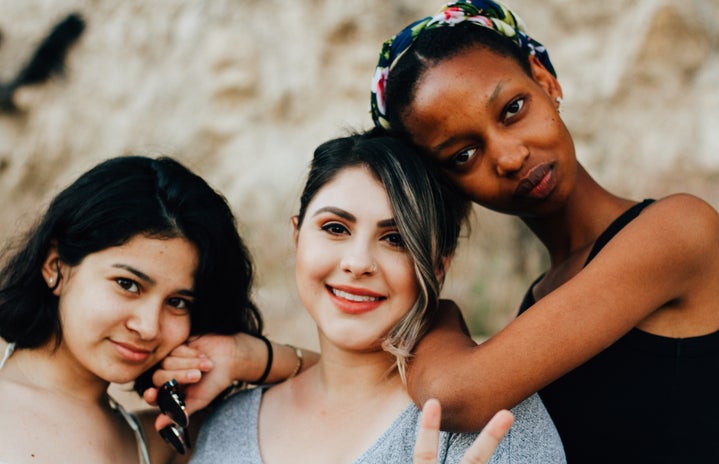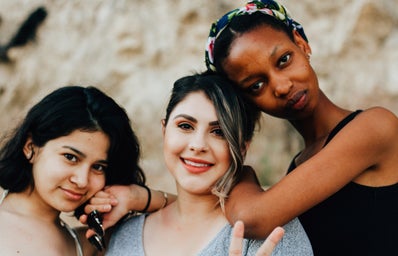Every year when International Women’s Day comes and goes, it gives us an opportunity to reflect on where we stand in our feminist skins. The day forces me to ask myself – is my wax routine really necessary? Am I really pushing myself enough to challenge casual sexism? Am I doing enough for vulnerable women and am I doing enough for myself? The day brings into question whether I am making the choices to be the feminist I want to be.
While it is useful to reflect, the point of the day is not to enter a negative, self-deprecating spiral. It’s to make sure we continue, everyday, to celebrate how far we have come. Part of that is celebrating who has brought us here, whether that’s Emily Davidson, Malala Yousafazai, our mothers, or even our teachers and friends. I would not be the woman I am today without the female influences and friendships that have shaped me to this day.

I vividly remember hearing a girl in my GCSE English class talking about feminism. While I didn’t really understand what it was back then, when I heard that word the image conjured was of extreme, hairy “man-haters.” Embarrassing as it is to admit, I used to tell people that whilst I “believed in equal rights, I was not a feminist.”
In my formative years, as I got older, my female friendships continued to develop and become more intimate. Sitting amongst our sleeping bags and Cadbury’s wrappers playing Never Have I Ever, discussions of masturbation would cause us all to squeal, recoil and blush – unable to make eye contact with one another. As we matured together, exciting secrets developed on issues only the girls could talk about. Bundling into the toilets at break time to host secret debates: tampons versus pads or pill versus implant. These intimate conversations about our bodies, so exclusively connected with our sex, could only be shared between us as girls. We developed an intimacy where these previously taboo subjects could be pulled out in the open and dissected, reluctantly at first but eventually with our new, comfortable confidence.

During Year 11, in one Religious Education class at my all-girls Catholic school, they brought in a pro-life speaker. The speaker proceeded to talk about dressing provocatively asking “if you left a £50 note on the table, would you really be able to blame anyone for stealing it?” The analogy was used to argue that women were to blame for displaying their bodies, rather than the men who view them with a misogynistic gaze. The speaker was immediately challenged by a girl in my class on the comparison of a piece of paper to a functioning human being. I was in awe of her, and although I didn’t fully understand the issue, the discussion stuck in my mind. Without consciously considering it, my friends led me to start unlearning the societal biases that had been crammed into my young and vulnerable mind. Not everyone will have experienced this particularly insane Catholic school story; however, most women can definitely relate to being made to feel like they are responsible for men’s behaviour.
During Sixth Form, my awareness of real, day-to-day sexism became increasingly astute. Before, it was the basic level of my friends asking me “do you believe in equal rights between men and women?” “Well, yes, duh!” “Okay, then you are a feminist!” It seemed so simple.
This simplicity became more muddled when thrown into mixed-sex classrooms, dominated by boys who radiated natural confidence in their intelligence and abilities. I had been told my entire school life to raise my hand when I wanted to speak, yet I found myself spoken over time and time again. Surprise would flicker over male peers’ faces when the girls did better than them in a test. My friends and I would overhear different girls’ arses being casually compared and objectified in the hallway. Obviously, not all boys were like this, but, suddenly, it wasn’t so simple as just believing in equal rights. I had to act quickly by changing my behaviour. During this time, I needed my girls more than ever. To shake me out of my urge to dress for the male gaze. To talk back over the boys who talked over me. To call out our male friends when they made a careless slur. To be as confident in my intelligence as they were.

Thanks to some of these incredible women, I came to university with an understanding of my self-worth. Fragile and not fully formed, but an understanding that I deserved to be here. As we get older, and the sexism grows more apparent and frustrating, our female spaces became more important. To provide a space where we don’t constantly have to prove ourselves, or feel desirable, or be mansplained to, or feel the pressure to be docile and sweet. We need to be around the friends who shout, “I’m young enough to be your daughter, mate!” back at the wolf whistling packs of men loitering by the corner shops. The friends who say “what do you mean your boobs are out too much? If you feel good, wear it” as you pull tops on and off in front of the mirror before a night-out. The friends who listen patiently to your endless rambles about a guy who doesn’t deserve your endless rambles.

My friends have formed who I am as a woman and importantly, who I am as a feminist. As I continue to grow, strengthening my support structure with new female friendships, the women around me continue to challenge my perceptions, most importantly towards myself.
Words by India Woodward.
Edited by Flora Lonie.



